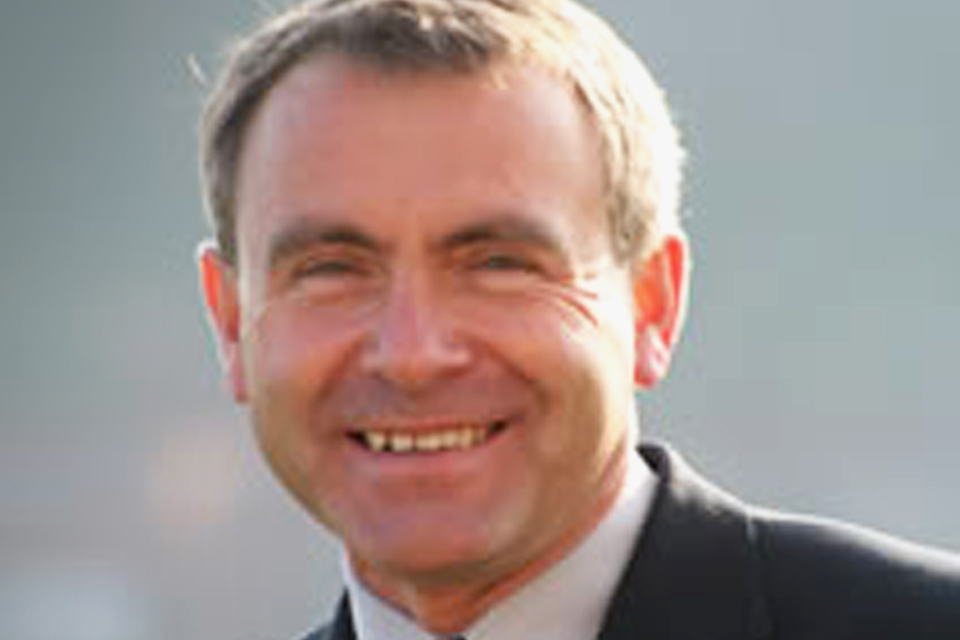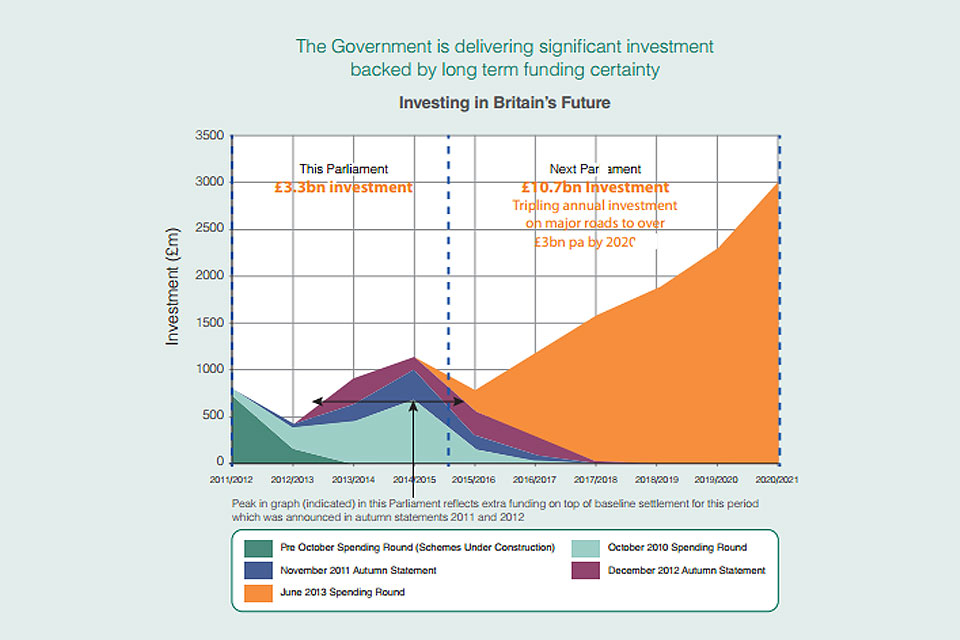Road investment
A new approach to investing in road improvements will put a full stop to stop-start spending.

I’m delighted to have been invited to attend this morning’s workshop (10 February 2014).
Ahead of last year’s Spending Review you challenged us to take bold steps to increase investment and make a long term commitment to capital infrastructure.
This morning has been about how we can best deliver the record investment in our road network that we announced last year.
I’d like to say a few words this morning about why we are investing in Britain’s roads, why, to be successful, we need to do things differently and why we want to work in partnership with you to make that happen.
I read an account of a parliamentary debate on the state of Britain’s roads recently.
It didn’t make for a comfortable bedtime story.
Honourable members were complaining to the minister that despite record increases in the traffic on the roads, investment simply hadn’t kept pace.
What was even worse was the government’s dire project management.
Stop-start spending meant works got off the ground but were endlessly delayed and then scaled back.
As projects stalled, costs increased and any improvements that did happen took years longer than projected.
One honourable member described the situation as “pathetic”.
Another was so irate that he proposed an amendment to the bill.
The amendment would give the transport minister automatic access to borrowing for road improvements - without needing Treasury approval.
The year was 1949.
And the debate was on the Special Roads Act that paved the way for Britain’s motorway network.
So while the motorways were eventually built over the next 50 years or so many fundamental problems have remained.
Today, the road network is even more essential to the UK’s economy.
Poor quality roads increase fuel consumption, increase delays, mean more emissions and act as a brake on growth.
But while over the last 50 years the volume of traffic in this country has risen dramatically, investment in the road network did not keep pace.
The UK now has more vehicles per kilometre of road than France, Germany or even the densely packed Netherlands.
Historically, road maintenance and repair have also been the first victims of short-term financial planning.
Investment in the road network has gone up and down faster than Bradley Wiggins through the Yorkshire Dales.
Short-termism that created uncertainty for the industry, delays to major projects and resulted in significant cost over runs.
To correct a legacy of historic underinvestment, we are putting record amounts into improving Britain’s transport network.
Modernising our roads, rail, air and local transport to help keep Britain moving.
The chart in front of you shows the scale of the investment our road network in context.

Graphic from the 'Transforming England's strategic road network' leaflet. Graphic displays the investment in yearly amounts including spending rounds of October 2010, November 2011, December 2012, June 2013 and pre-October 2010.
In total, £24 billion will be invested in the strategic road network in this Parliament and the next and by 2021 we will be spending £3 billion each year on improvements and maintenance.
This is the most significant upgrade of our roads ever.
In total, creating around 30,000 new jobs.
Creating a safer, more sustainable, road network.
But it is not just about announcing the investment and identifying schemes that are needed.
As you have heard today (10 February 2014), we are determined to learn the lesson of history and change just how we deliver these improvements to our road network.
First, as John Dowie said, we are changing the way we fund road improvements and maintenance.
I know stop-start investment has been a problem for you in the past.
That’s why we have set out long-term, guaranteed plans to 2021.
The new road investment strategy will be backed by legislation that will oblige government to fund the schemes it has announced.
We are absolutely committed to putting the legislation in place before the end of this Parliament.
And we are equally committed to publishing the first roads investment strategy at the same time.
Many of you will know how certain investment in rail is thanks to the High level output specification.
By April 2015, road investment will be on the same long-term footing that will enable you - like the rail industry - to have the security to take commercial decisions today.
We are committed to making these changes now, locking in funding for the long-term, so you have the certainty you need to invest.
Second, as Graham Dalton covered, we are changing the way the Highways Agency operates.
Responses to the consultation on the changes we’ve proposed to the Highways Agency have been broadly positive.
But they have also raised a number of very important issues I want us to get right.
We’ll be publishing our formal response in the near future, but in the meantime the headline is; the Highways Agency will become even more commercially focussed
That means it will be a better partner for you to work with, be more accountable to road users and get better value for money for the taxpayer.
What we need to do now is get on and make a difference on the ground.
I was pleased to hear so many practical suggestions this morning’s (10 February 2014) breakout groups for how we can do things faster, cheaper and better.
We have set out long-term plans to give you the confidence you need to invest and grow today.
Otherwise, given the scale of the investment we are making, capacity is going to become a problem.
For example, opening a new aggregates quarry can take years of careful negotiation.
And it takes around three years to train an apprentice civil engineer.
So we need you to start to scale up over the coming months.
Invest in the equipment you need and create new jobs.
Or we risk the kind of bottlenecks that have in the past created delays and undermined public confidence.
That means taking on more apprentices and more graduates.
We also have to get the message out to young people taking their GCSEs and even younger that there are high quality jobs available in one of the world’s fastest moving, most dynamic industries.
I’d like to hear what your plans are to begin to scale up.
We will help unblock obstacles where we can and I want to help you bang the drum for new apprentices and graduates.
So, in conclusion, we are making a historic and sustained investment in Britain’s road infrastructure.
Because it is good for road users, good for the economy and good for the country.
We are also transforming the way that investment will be delivered.
Putting a full stop to stop-start.
We are investing for the long-term.
A commitment that will be backed up in legislation by next year.
We want to work in partnership with you to get the best value for money for the taxpayer.
That means, in return, we need you to invest today in ensuring you have the equipment and the staff with the skills needed, to keep Britain moving tomorrow.
Thank you.